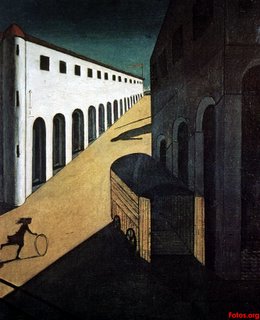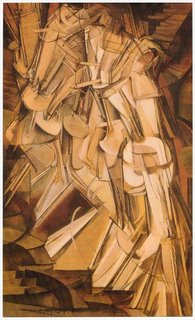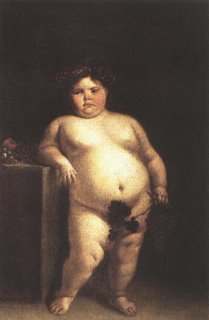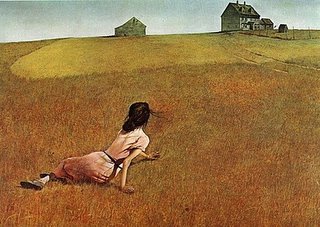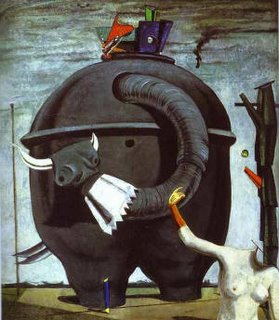I dislike the word "journey" to describe a narrative experience. "'War and Peace' took me on such a journey!" I hate it even more when it's used to describe a life experience:
Reporter: How did you feel after your husband set fire to your house and all your children got roasted alive?
Mother: Well, I tell myself that life is a journey...
Yeah. A journey to hell!
I feel the same way when people say, "Everything happens for a reason." Lord, I hate that.
Reporter: How did you feel when you lost all your money, got fired and developed a brain tumor?
Interviewee: Well, I just tell myself that everything happens for a reason.
Yeah. The reason: God hates you. I don't think I can ever square myself with "Everything happens for a reason." It's not because I'm an atheist, although that does make things simpler for me. My simple retort (which I would never actually say in real life -- I don't want to offend) is, "No, everything DOESN'T happen for a reason," or, more accurately, "Yes, everything DOES happen for a reason, which can be traced back to the Big Bang. You lost all your money because the billiard ball of your life got hit by another billiard ball which got hit by a third billiard ball which, if you go back enough balls, got hit by the pool cue called 'the Big Bang.'"
Even if I was a believer, I would think, "Yup. Everything happens for a reason. So what? The reason might be that God has decreed that you suffer, in order to serve some 'greater' purpose." I think when people say, "Everything happens for a reason," they mean, "Everything happens for a reason that will ultimately work out for my own good," and why should that be, in a theistic or non-theistic world? Does the universe exist to serve you?
Despite all this, I often feel like I must make peace with "journey", because how else can one describe certain experiences? Having grappled with this for some time, I present to you an alternative. But it's one that may leave you unimpressed. Still, it's worth discussing, because if it DOES leave you unimpressed, you may learn something useful about yourself, your attitudes towards art, and your attitudes towards ... food.
Why food? Because my replacement for journey is "meal." "King Lear" is a five-course meal, containing a lot of roughage and many bitter dishes -- but if you spoon off the top layer of the rancid pudding, there's a delicate creamy center underneath. One bite of it will make you weep. On the other hand, "Gilligan's
I suspect many would balk at comparing great works of literature to food. Why is this? Is it because they consider this a comparison between the sublime and the banal? If so, are they over-valuing art or under-valuing food -- or both? Is it because dinner is ephemeral while art is ever-lasting? (Wow, what a can of worms! IS art ever-lasting? IS every production of "Taming of the Shrew" somehow part of a platonic whole? Or is each one a rose that eventually wilts and dies? A similar rose may take its place -- but this new rose IS a New Rose. And what of rereads? Is "The Great Gatsby" the same book this year as it was last year? How can it be when I have changed? Of food: is this Thanksgiving's apple pie the same as last Thanksgiving's apple pie?)
I like the "meal" metaphor, because it captures what I think art does best. Food and art are great catalysts for sensation. One could argue that food rarely touches the intellect. I don't care, because I have a bias against intellectual art. So I'd say that if a story primarily makes you think (rather than feel), it's like a meal that is historically interesting (the eel's eye they ate in the Middle Ages) but doesn't taste very good.
Perhaps the biggest objection is that food -- no matter how luscious -- is prepared by humans, and is limited by the boundaries of human minds, hearts and hands. Whereas art is spiritual. (Or is food spiritual, too? "We thank thee, Lord, for this dinner...") As an atheist, I can't see art as spiritual. Nothing is spiritual to me, because there is no such thing as spirit (unless "spirit" is simply a metaphor for something more ordinary, like "heartfelt" -- I have to be careful, because when I tell people "I'm not a 'spiritual person,' they often assume I'm claiming that I'm a sort of cold Mr. Spock-like character. I actually DO have feelings. I just don't think they come from the astral plane.) To me, art is either an accidental process (i.e. a beautiful, found object) or a human construction -- or, usually, a combination of the two. Much like a good meal.
And like a good meal, great art is greater than the sum of its parts. I will pour all my love into this stew, hoping that when you eat a spoonful, you will feel warm and loved and peaceful -- but the surprise is that you may feel much more. My carrots may be cooked just so, causing you to recall a scene from your youth. Much the same thing happened to Proust's hero in "A Search for Lost Time." He bit into a Madeleine and triggered several thousand pages of memories.
